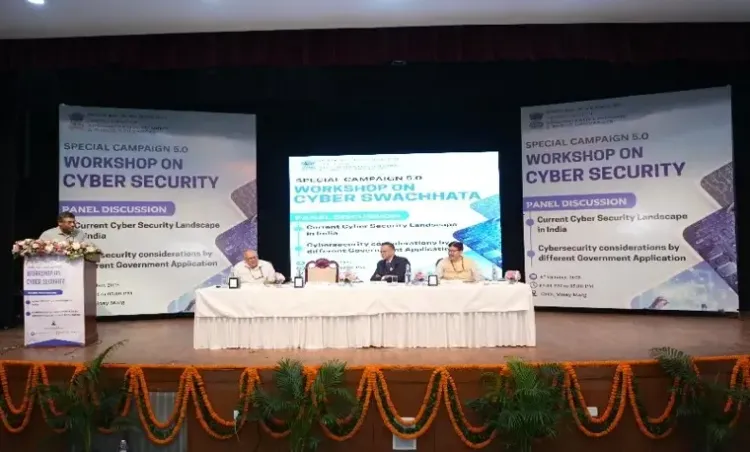How Are Officials Enhancing Cyber Resilience and Hygiene in Delhi?

Synopsis
Key Takeaways
- Importance of Cyber Infrastructure: A robust system is crucial for safeguarding public e-Governance.
- Responsible Data Use: Officials emphasized the need for judicious data handling.
- Cyber Hygiene Practices: Simple methods can greatly enhance security.
- Digital Signing: Encouraged to improve e-Office efficiency.
- Public Trust: Strengthening trust in digital services is essential.
New Delhi, Oct 9 (NationPress) The emphasis on a strong cyber framework to protect public e-Governance systems was the focal point of discussions during a workshop for senior Central government officials organized by the Department of Administrative Reforms and Public Grievances (DARPG), as mentioned by an official on Thursday.
While addressing the Cyber Swachhata Workshop, Ministry of Electronics and Information Technology (MeitY) Secretary S. Krishnan stressed the significance of using data responsibly and judiciously.
At the event hosted at the Civil Services Officers’ Institute (CSOI) on Wednesday, he pointed out the necessity for individuals and organizations to adopt best practices that promote a clean, safe, and secure cyber environment, which in turn enhances overall digital resilience and trust in online systems, as stated by an official.
This workshop was inspired by the creation of the Cyber Swachhta Kendra by the Indian Computer Emergency Response Team (CERT-In) under MeitY.
The aim of the workshop was to elevate cybersecurity awareness, showcase MeitY’s initiatives, and highlight the necessity for a robust cyber infrastructure to protect public e-Governance systems.
DARPG Secretary V. Srinivas discussed the use of e-Office analytics and its features. He emphasized the need to review VPN usage, identify non-active users at each level, and deactivate inactive accounts after proper verification.
He encouraged departments to prevent the accumulation of part-files and implement the practice of digitally signing eFiles, advocating for an average distinct level of four for efficient e-Office operations.
CERT-In Director General Sanjay Bahl presented initiatives for cyber resilience by CERT-In and elaborated on the concept of cyber resilience as the capacity to foresee, endure, recover from, and adapt in response to cyber threats.
S.S. Sharma, Scientist-G, CERT-In, discussed simple yet effective cyber hygiene practices, such as maintaining secure passwords, verifying link authenticity before clicking, and checking website security certificates.
Anjali Dhingra, Scientist G, NIC, focused on application security in e-Office, emphasizing layered protections, encryption, strong authentication, and monitoring measures to ensure both system and user security.
Anil Bansal, Senior Director (IT), DoPPW, addressed the Bhavishya Portal, which enables transparent, accountable, and timely pension processing across Central Ministries. Covering 99 Ministries, 1,037 Offices, and 9,590 DDOs, the portal issues around 300,000 PPOs and secured the 3rd rank in NeSDA 2021.
Sanjeev Saxena, Senior Technical Director, NIC, DARPG, talked about security measures in CPGRAMS, the centralized system designed for receiving, tracking, and resolving citizen grievances.









